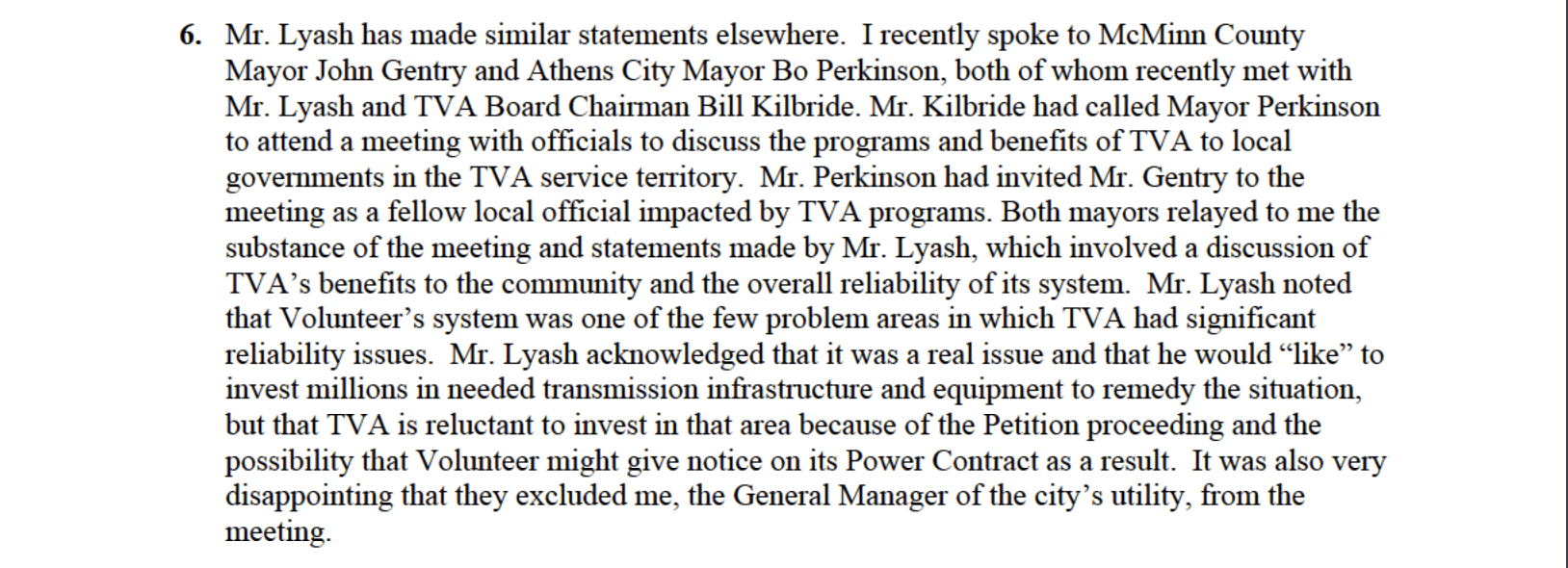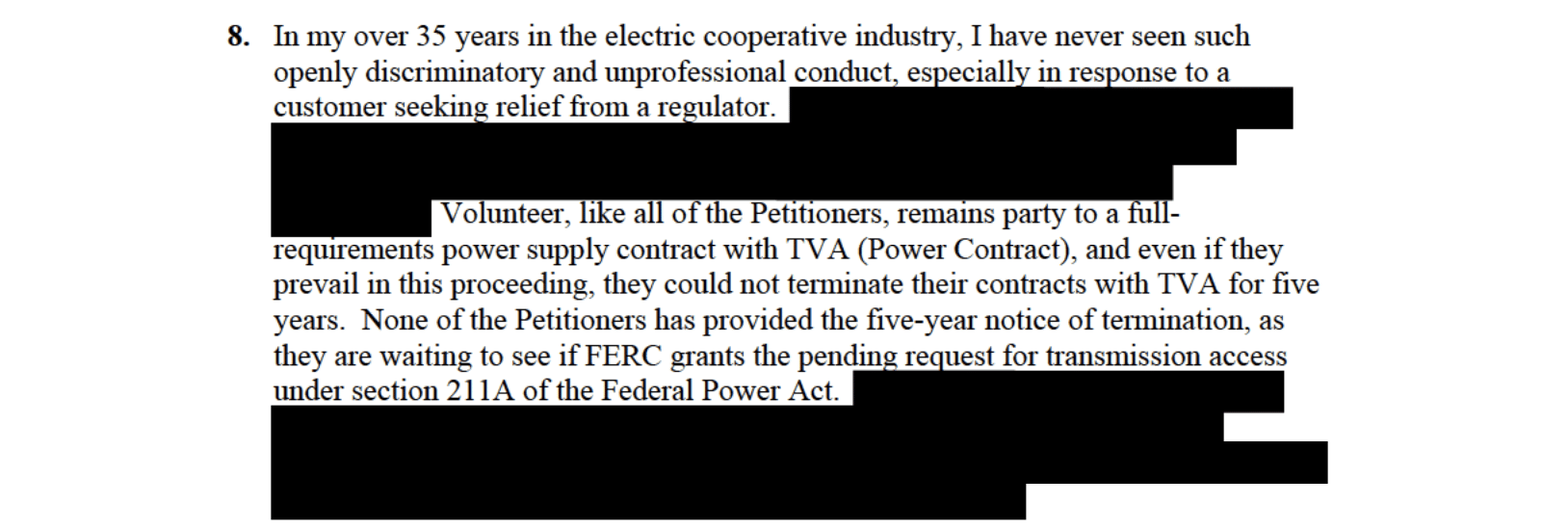With less than a week before a decision at FERC is expected, sworn statements assert TVA retaliated against utility customers that are seeking the ability to pay TVA to use its transmission system without remaining a customer of TVA.
Maggie Shober | October 18, 2021 | Energy Policy, TennesseeIn February of 2021, four Local Power Companies (LPCs) that currently purchase power from the Tennessee Valley Authority (TVA) petitioned the Federal Energy Regulatory Commission (FERC) that TVA was not complying with federal law by blocking the LPCs from using TVA’s transmission to purchase power from a source other than TVA (FERC Docket #EL21-40).
Refresh your memory or get caught up with our blog posts on the original filing and us at the Southern Alliance for Clean Energy’s (SACE) response.
The LPCs are not asking TVA to use the transmission system for free. And TVA has told these LPCs no, they cannot even pay to use TVA’s transmission system without also purchasing 100% of their power from TVA. Federal law is clear that utilities must offer access to their transmission systems at a reasonable price, however, TVA is claiming that it is exempt.
This has significant implications for not only these LPCs that are Petitioners but also for the pending decision in Memphis where the local utility, Memphis Light Gas & Water (MLGW) has a Request for Proposal (RFP) out for transmission that would duplicate TVA’s transmission across the Mississippi River.

Latest: Petitioners claim retaliation
On Friday, October 15, 2021, the Petitioners in this case (the LPCs seeking transmission access) filed four affidavits from individuals about statements from TVA’s CEO Jeffrey Lyash recently made at a late summer Tennessee Valley Public Power Association (TVPPA) meeting. While the recounts of Lyash’s statements are redacted from public view, one of the affidavits has an unredacted section that starts with, “Mr. Lyash has made similar statements elsewhere,” and therefore we have an idea of the content of Lyash’s statements.
Athens Utilities Board (AUB), one of the LPCs that is petitioning FERC for access to TVA’s transmission, serves Athens, Tennessee, a city of about 14,000 between Knoxville and Chattanooga. The unredacted portion of AUB’s General Manager, Eric Newberry Jr., affidavit states Lyash and TVA Board Chair, Bill Kilbride, both met with Athens local officials (the city and county mayors).
Newberry went on to say that in that same conversation, Lyash noted TVA’s system is unreliable in the area of Volunteer Electric Cooperative (VEC), but Lyash was reluctant to fix the situation because another LPC, Volunteer Electric Company (VEC), brought the Petition to FERC and the possibility that VEC might leave TVA after the five year termination period in its contract. Lyash appears to have made similar statements at the TVPPA meeting in question: that TVA won’t upgrade its transmission to improve the reliability to VEC because of the Petition pending at FERC.

Newberry goes on to state in his affidavit that he was “taken aback by this statement,” from Lyash and that both AUB and VEC pay “millions of dollars each month in wholesale power charges to TVA,” with TVA’s side of the contract being to supply reliable power. Newberry suspects Lyash’s statements were an attempt to influence the small-town-mayor to pressure AUB to withdraw from the FERC petition, in a similar strategy that was “taken with Joe Wheeler EMC‘s board members that resulted in their withdrawal from the Petition.” Joe Wheeler EMC covering parts of Alabama joined the initial Petition but has since withdrawn.
Newberry concludes his affidavit, “None of the Petitioners should be punished for exercising our rights,” and, “TVA should not be able to use our attempt to assert those rights against us as a basis to put off upgrades needed to ensure reliable service to us and, by extension, our members, especially while we still have a contract in place under which TVA is required to provide reliable service and to address problems that undermine reliability.”

Besides Newberry, the filing includes affidavits from three other individuals who were also in attendance at the TVPPA meeting:
- Roderick Blevins, VEC’s President and CEO (Page 10)
- Daniel Rodamaker, Gibson Electric’s President and CEO (Page 15)
- Michael Whiteside, an energy consultant, Vice President at EnerVision, and a former executive of an electric cooperative in Georgia (Page 25)
Notably, Whiteside stated in his affidavit, “In my over 35 years in the electric cooperative industry, I have never seen such openly discriminatory and unprofessional conduct, especially as a response to a customer seeking relief from a regulator.”

Open Secret: TVA is Retaliatory
Here at SACE, we’ve talked to a number of LPC staff and people that do business with TVA on a regular basis. The retaliatory behavior described above is unacceptable, particularly for a public power entity, but not surprising based on what we have heard in the past. LPCs, energy project developers, and even consultants are reluctant to do or say anything publicly that TVA could view negatively for fear of retaliation or losing business. Unfortunately, there are consequences of this kind of behavior. TVA’s customers are the ones missing out as a result of TVA’s constraints on competition.
The real story here is TVA leadership has been using heavy-handed tactics lately to shore up their monopoly in a sector where more and more action is at the distribution level. For example:
- Local utilities want to own their own generation, TVA retaliates and requires them to sign a never-ending contract for a mere 5% “flexibility” (which in practice caps out at 3%) and promises that that percentage may someday increase.
- Households and businesses in the region want to provide economic power to themselves and their neighbors by installing solar. TVA axes the last remaining program it had to compensate those customers for what they generate and puts a grid access charge in place to financially harm LPCs that encourage rooftop solar and/or energy efficiency among customers.
FERC puts TVA case on Agenda This Week
FERC holds meetings every month, and this case (#EL21-40) is on the agenda for FERC’s meeting this Thursday, October 21, 2021. FERC could still choose to delay a decision on the case, particularly if it wants to provide TVA additional time to respond to the Petitioners’ filing described here – there is no deadline for FERC to make a decision.
Since there are currently four FERC Commissioners, a tie vote could mean the Petition is not approved by FERC but Petitioners are free to re-file. If a majority of the Commissioners vote either in favor of opening transmission or back TVA’s claims of an exemption, the case is not necessarily final, but it would mean an uphill battle for the losing side.
The first step after Thursday’s decision would be for the losing party to file for FERC to rehear the case, and then appeal the case to the DC Circuit Court. In all likelihood, this case could ultimately end up before the Supreme Court.
We will be following closely and will post updates on the FERC decision that could come as early as this Thursday (watch along online, the meeting starts at 10am eastern time), as well as whether the case is moving on to the Courts.